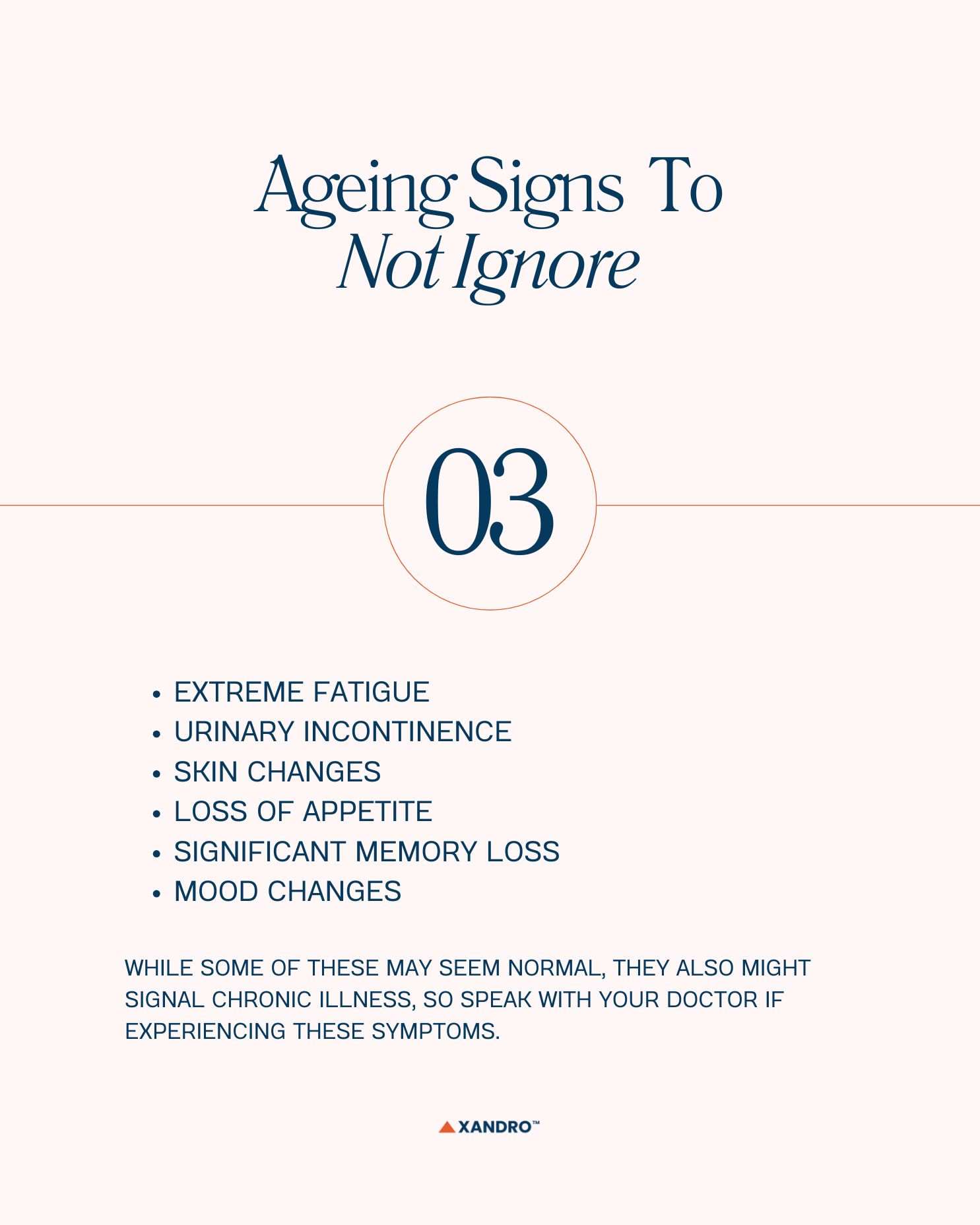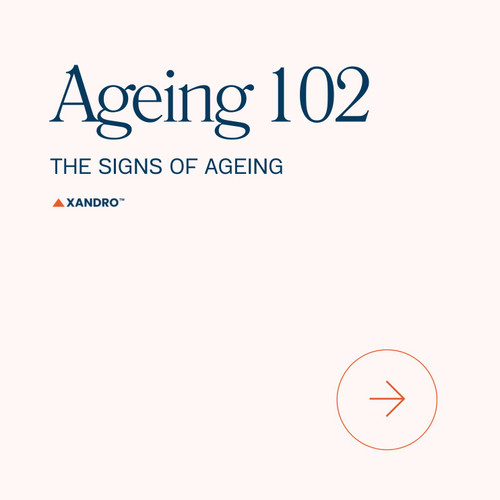Signs of Ageing: Symptoms, Skin Changes & Ageing Well
17th Dec 2024
Ageing 102: The Signs of Ageing
When we think of ageing, we generally think of grey hair and wrinkles, but what are some other symptoms of old age?
To learn more about what happens inside your body that causes you to age, you can read about it in Ageing 101: The Hallmarks of Ageing.
Jump there now:
- What Are the First Signs of Ageing?
- Symptoms of Ageing in the Body
- Skin Ageing Signs
- Signs You Are Ageing Well
- Signs of Ageing You Should Not Ignore
- Can You Reverse the Signs of Ageing?
Products related to the reading:
This will depend on the person, their genetics and the type of life they live, such as whether they’re out in the sun often, put sunscreen on or smoke.
There are symptoms that for many people, begin to appear first though and are an indicator of one simply getting older in life, and most of these have to do with the skin as they’re usually the first we see and take notice of.
When Does Skin Ageing Start?
- Fine lines often appear in your 20s.
- Skin starts losing elasticity in your 30s.
- By your 40s, dryness and deeper wrinkles may set in.
- By your 50s, you may notice thinner skin on your hands and hair loss.
Fine Lines & Wrinkles: Appear first on the forehead and around the eyes (crow’s feet) due to reduced collagen and elastin. Use sunscreen, moisturisers, eat antioxidant-rich foods and get enough sleep.
Hyperpigmentation (Dark Spots): Caused by sun exposure or hormonal changes. To help, apply sunscreen daily; chemical peels or vitamin C serums can lighten spots.
Dryness & Dullness: Skin loses its glow due to slower cell turnover and reduced natural oils. Use hydrating products with hyaluronic acid, eat a balanced diet, and stay hydrated.
Cardiovascular System
As you age, your blood vessels stiffen, making your heart work harder. Your heart rate at rest stays the same but doesn’t increase as much during activity. These changes raise the risk of high blood pressure and heart issues.
What to do:
- Exercise daily: Walk, swim or do activities you enjoy.
- Eat healthy: Focus on fruits, vegetables, whole grains and lean proteins. Limit salt and unhealthy fats.
- Avoid smoking: It damages arteries and increases heart strain.
- Manage stress: Try meditation, exercise or therapy.
- Sleep well: Aim for 7–9 hours nightly.
Bones, Joints, and Muscles
Bones lose density, making them weaker and possibly shorter. Muscles lose strength and flexibility, increasing the risk of falls and fractures.
What to do:
- Get calcium: Aim for 1,000–1,200mg daily from dairy, greens or supplements.
- Get vitamin D: 600–800IU daily from sunlight, fish, eggs or supplements.
- Stay active: Weight-bearing exercises like walking or jogging strengthen bones.
- Avoid smoking and heavy drinking: Both weaken bones and increase injury risk.
Digestive System
Ageing can lead to constipation due to changes in the intestine, low activity, dehydration or low fibre intake.
What to do:
- Eat fibre: Focus on fruits, veggies and whole grains.
- Stay hydrated: Drink plenty of water.
- Stay active: Regular movement helps digestion.
- Listen to your body: Don’t delay bowel movements.
Bladder and Urinary Health
Your bladder becomes less elastic, causing frequent urination or incontinence. Weak muscles, nerve issues or prostate problems can worsen this.
What to do:
- Toilet schedule: Go regularly to avoid urgency.
- Stay healthy: Lose weight and quit smoking.
- Do Kegel exercises: Strengthen pelvic muscles.
- Avoid irritants: Limit caffeine, alcohol and acidic foods.
- Prevent constipation: Eat more fibre to ease pressure on the bladder.
Memory and Thinking Skills
Normal ageing can make it harder to recall names, multitask or think quickly.
What to do:
- Stay active: Exercise boosts brain blood flow and lowers stress.
- Eat smart: A heart-healthy diet supports brain health.
- Keep learning: Read, play games or take up new hobbies.
- Be social: Connect with others to reduce stress and improve mental health.
- Quit smoking: It benefits brain health.
Further Reading: Supplements for Cognitive Health
Eyes and Ears
Vision changes may include trouble focusing, sensitivity to glare or cataracts. Hearing loss may affect high-pitched sounds or conversations in noisy settings.
What to do:
- Get checkups: Use glasses, hearing aids or other recommended devices.
- Protect yourself: Wear sunglasses for UV protection and earplugs in loud environments.
Beautiful skin reflects youth more than being wrinkle-free as you can get wrinkles at a young age due to sun damage, smoking, repetitive movements, sleeping positions and genetics. Here are some signs of skin ageing you may notice:
- Wrinkles and fine lines: Caused by weakened collagen and elastin, leading to looser skin.
- Dull skin: Ageing slows skin renewal, reducing glow and moisture.
- Uneven tone: Hormonal changes and uneven melanin cause patchy skin.
- Dryness: Ageing reduces the skin’s ability to retain moisture, causing dryness.
- Blotchiness and spots: Thin skin reveals blood vessels; UV exposure causes brown spots.
- Rough texture: Slower cell turnover leads to uneven, bumpy skin.
- Visible pores: Gravity and elasticity loss make pores appear larger.
Modern treatments and healthy habits like wearing sunscreen, staying hydrated, exercising and avoiding smoking or excessive sun can slow signs of ageing.
Ageing well means staying healthy, active and mentally sharp as you grow older. It’s about how you care for your body and mind, not just the number of candles on your birthday cake. To tell if you’re ageing well, here are some signs you might notice:
Healthy Skin
- Smooth and soft: Skin that feels plump, moisturised and not overly wrinkled shows good care. This comes from drinking enough water, using sunscreen daily, moisturising, eating healthy and getting proper rest.
- Even tone and texture: Balanced skin without dark spots, redness or rough patches suggests good health. Protect against sun damage by wearing sunscreen and hats and consider using skincare products with vitamin C or retinol to improve tone and texture.
Further Reading: Skincare Anti-Ageing Routine
Strong and Flexible Body
- Muscle maintenance: Staying physically active with exercises like weightlifting, yoga or even regular walking keeps muscles strong. This is essential for balance, posture and doing everyday tasks like climbing stairs or carrying groceries.
- Flexibility: Being able to bend, stretch and move easily shows that your joints and muscles are in good shape. Regular stretching or activities like yoga or Pilates help keep your body flexible and reduce stiffness or pain.
Energy and Stamina
- High energy levels: Feeling refreshed and energetic throughout the day is a good sign of overall health. Eating a nutritious diet, staying physically active and getting enough sleep are key.
- Physical activity: Being able to enjoy hobbies like gardening, walking or dancing without getting overly tired shows good stamina. Regular exercise also boosts endurance and helps you stay active longer.
Good Posture and Balance
- Upright posture: Standing tall and avoiding slouching means your spine and muscles are strong. Practice standing and sitting straight, keeping your shoulders relaxed but aligned.
- Balance: Being steady on your feet and not prone to falls indicates good muscle strength and coordination. Balance exercises, like yoga or tai chi, help keep you stable.
Sharp Mind
- Clear thinking: Being able to focus, solve problems and think quickly shows a healthy brain. Activities like puzzles, reading or learning new hobbies keep your mind active.
- Good memory: Remembering names, dates or where you left your keys is a sign of good cognitive health. Brain exercises, along with regular sleep and a healthy diet, can improve memory.
Further Reading: Nootropics that a Fitness Enthusiast Might Take
Some changes as we age, like weaker muscles, skin damage or lower energy, seem normal but might signal chronic illness instead of ageing alone.
Watch for these serious symptoms and speak to your doctor if they occur:
- Extreme fatigue: Could signal heart disease, diabetes, cancer or liver issues.
- Urinary incontinence: May indicate an enlarged prostate, menopause effects or other health problems.
- Skin changes: New bumps or moles might be signs of skin cancer.
- Loss of appetite: Could point to liver, kidney, or heart problems, dementia or cancer.
- Significant memory loss: More than typical forgetfulness, it might be dementia.
- Mood changes: May suggest depression or loneliness.
Even small health changes can indicate something serious, so don't ignore them.

The best way to combat premature ageing is by adopting healthy habits early, but if signs of ageing bother you, certain treatments can help, such as dermal fillers, facelifts or laser resurfacing. These treatments improve appearance but don’t fix the root causes.
Lifestyle Changes to Slow Ageing:
- Quit Smoking: Smoking damages skin and overall health.
- Drink Moderately: Limit alcohol to avoid harming your cells.
- Get Enough Sleep: Rest helps your body repair itself.
- Eat Smart: Cut out unhealthy fats and sugar; focus on whole grains, veggies and omega-3-rich foods like salmon.
- Exercise Regularly: Stay active to boost circulation and keep skin healthy.
- Use Skincare: Use sunscreen daily, stay hydrated and moisturise your skin. Also, incorporate antioxidant-rich products like vitamin C.
- Have a Positive Mindset: Embrace ageing as a natural process and stay mentally active, not being be afraid to make life changes.
Further Reading: NMN for Longevity
End Note
Looking younger depends more on your lifestyle than your actual age. Regular exercise, a healthy diet, proper sleep and good skincare habits can slow cellular ageing and keep your skin and body healthier for longer.
You might be looking for supplements to help slow your ageing, to which there are many studies supporting various supplements. NMN can help increase NAD+ in your cells, potentially deaccelerating ageing in humans, while Ashwagandha supports cognitive health.
Xandro has also released two new supplements, LPC Neuro, which brings omega-3s directly into the brain to support brain health and age-related cognitive decline, as well as Protocol X, a longevity ‘multivitamin’ packed with ingredients to support anti-ageing and cognitive health. Learn more about them below!
Products related to the reading:
